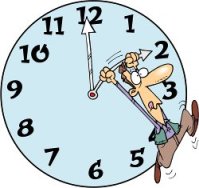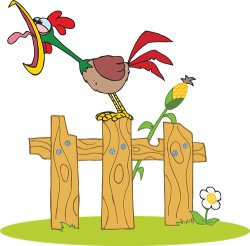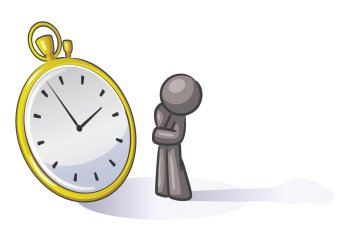Prepositions of Time:
At, In, or On?
When we want to talk about when an action happens, we must use prepositions. The most common are at, in, and on. Each has its own special uses.
Click Here for Step-by-Step Rules, Stories and Exercises to Practice All English Tenses
First, look at the table below for a quick reference of the rules.
| at | in | on |
| a
specific time a meal time |
a
month/season/year a part of the day |
a
specific day or date a day + (morning, night, etc.) |
Now, let's look at examples of each preposition. At the end of the lesson, there is a link to our booklet with lots more examples and exercises!

At
1. We use the preposition at when we want to refer to a specific time, meaning a specific hour.Example:
- Henry's test ends at 3 o'clock! He is afraid he won't finish!

More examples:
- Your plane leaves at
4:55pm. We should go to the airport now.
- I ate my breakfast very early this morning. Could we have
lunch at
12:30?
- She had a doctor's appointment yesterday at 7 o'clock.
2. We can also use the preposition at when we are referring to a meal time.
Examples:
- At
lunch, I like to have a big glass of water.
- We always listen to the radio at
breakfast-time so that we can hear the morning news.
- Her family never turns on the TV at dinner.
3. Finally, we can use at for some fixed expressions. Look at the sentences below.
Examples:
- At that time,
Maggie didn't know that he was a secret agent!
- She was about to make a cup of tea, but right at that moment, the phone rang.

In
1. We use the preposition in when we are referring to a year, month, or season.Example:
- We love to go to the beach in the summer to build sand castles and swim in the sea.

More examples:
- We moved into this house in
2003. We love this place!
- Classes will begin in
September. Be sure to sign up for all your courses before then.
- Back in the
1800s, women didn't have the same rights that they do today.
- In the winter of 1937, my grandfather was born.
2. We also use the preposition in when we want to talk about a part of the day.
Examples:
- Greg is never hungry in
the morning. His first meal is lunch!
- My uncle likes to take a nap in the
afternoon.
- Do your parents watch the news on television in the evening?
Example:
- Roosters never crow at night. They only start crowing in the morning.

On
1. We use the preposition on when we are talking about a specific day or date.Example:
- On Christmas Day, some families give each other gifts under the Christmas tree. Other families have their celebrations on different special days.

More examples:
- We have a very important meeting on
Wednesday. Please don't be late!
- She'll be arriving on the
5th of August. Will the apartment be ready by then?
- I'm starting my new job on Monday, July 12th. I'm a bit nervous!
2. We also use the preposition on when we are talking about a day + (morning, night, etc.).
Examples:
- There was a big parade on
Saturday afternoon. Didn't you hear the music?
- She has a lot of trouble getting out of bed on
Monday mornings!
- I like to go to the park on the weekends.

The rules are not complicated, but this can feel like a lot to remember! To be sure you really understand, visit our store for our special booklet on the Prepositions of Time: In, On, At.
You'll find all the explanations, exercises, and tables you need for reference, plus a story and answer key! It has absolutely everything you need to be sure you've got all the rules!
Get Updates, Special Offers, and English Resources
Download your FREE GIFT (the first two chapters of
English Short Stories Book and Workbook)
as soon as you join!

By submitting your email, you consent to receiving updates and newsletters from us and to the sharing of your personal data with third parties for the purposes of sending you communications. We will not spam you. You can unsubscribe at any time. For more information, please see our privacy policy.





